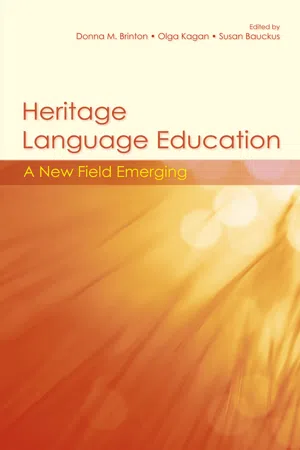
Heritage Language Education
A New Field Emerging
- 370 pages
- English
- ePUB (mobile friendly)
- Available on iOS & Android
Heritage Language Education
A New Field Emerging
About this book
"… focuses on issues at the forefront of heritage language teaching and research. Its state-of-the-art presentation will make this volume a standard reference book for investigators, teachers, and students. It will also generate further research and discussion, thereby advancing the field."
María Carreira, California State University – Long Beach, United States
"In our multilingual and multicultural society there is an undeniable need to address issues of bilingualism, language maintenance, literacy development, and language policy. The subject of this book is timely…. It has potential to make a truly significant contribution to the field."
María Cecilia Colombi, University of California – Davis, United States
This volume presents a multidisciplinary perspective on teaching heritage language learners. Contributors from theoretical and applied linguistics, sociolinguistics, psychology, educational policy, and pedagogy specialists explore policy and societal issues, present linguistic case studies, and discuss curricular issues, offering both research and hands-on innovation.
- The term "heritage language speaker" refers to an individual exposed to a language spoken at home but who is educated primarily in English.
Research and curriculum design in heritage language education is just beginning. Heritage language pedagogy, including research associated with the attrition, maintenance, and growth of heritage language proficiency, is rapidly becoming a field in its own right within foreign language education. This book fills a current gap in both theory and pedagogy in this emerging field. It is a significant contribution to the goals of formulating theory, developing informed classroom practices, and creating enlightened programs for students who bring home-language knowledge into the classroom.
Heritage Language Education: A New Field Emerging is dedicated to Professor Russell Campbell (1927-2003), who was instrumental in advocating for the creation of the field of heritage language education.
Frequently asked questions
- Essential is ideal for learners and professionals who enjoy exploring a wide range of subjects. Access the Essential Library with 800,000+ trusted titles and best-sellers across business, personal growth, and the humanities. Includes unlimited reading time and Standard Read Aloud voice.
- Complete: Perfect for advanced learners and researchers needing full, unrestricted access. Unlock 1.4M+ books across hundreds of subjects, including academic and specialized titles. The Complete Plan also includes advanced features like Premium Read Aloud and Research Assistant.
Please note we cannot support devices running on iOS 13 and Android 7 or earlier. Learn more about using the app.
Information
1
Who Are Our Heritage Language Learners?
Education in the United States
Introduction
- Indigenous languages spoken by Native American tribes that existed before the arrival of European settlers; many of these languages are now endangered;
- Colonial languages such as French, German, Italian, or Spanish, which earlier European settlers brought; and
- Immigrant languages such as Arabic, Chinese, Japanese, Vietnamese, Cambodian, or Korean that came along with more recent influxes of immigrants.
Conceptual Framework
Identity
Biliteracy3
Table of contents
- Cover Page
- Title Page
- Copyright Page
- Contents
- Preface
- An Introduction
- 1 Who Are Our Heritage Language Learners? Identity and Biliteracy in Heritage Language Education in the United States
- PART I Heritage Speakers: Demographics, Policy, and Identity
- 2 Learning Other Languages: Th e Case for Promoting Bilingualism within our Educational System
- 3 Policy Activity for Heritage Languages: Connections with Representation and Citizenship
- 4 Heritage Language Education in Canada
- 5 Chinese “Dialect” Speakers as Heritage Language Learners: A Case Study
- 6 Heritage Languages and Ideologies of Language: Unexamined Challenges
- 7 The Relevance of Bilingual Proficiency in U.S. Corporate Settings
- PART II Heritage Speaker Profiles and Needs Analysis
- 8 Heritage Language Narratives
- 9 Prior Language-Learning Experience and Variation in the Linguistic Profi les of Advanced English-Speaking Learners of Japanese
- 10 Academic Writing Proficiency of Russian Heritage Speakers: A Comparative Study
- 11 Stigmatized Spanish Inside the Classroom and Out: A Model of Language Teaching to Heritage Speakers
- 12 A Profile of Japanese Heritage Learners and Individualized Curriculum
- PART III Program Development and Evaluation
- 13 From Mirror to Compass: The Chinese Heritage Language Education Sector in the United States
- 14 Spanish for Native Speakers Education: Th e State of the Field
- 15 School-Based Programs for Heritage Language Learners: Two-Way Immersion
- 16 The Korean/English Dual Language Program in the Los Angeles Unified School District
- 17 Enhancing Academic Language Proficiency in a Spanish Immersion Classroom
- 18 “Oh, I Get It Now!” From Production to Comprehension in Second Language Learning
- 19 Locating and Utilizing Heritage Language Resources in the Community: An Asset-Based Approach to Program Design and Evaluation
- In Conclusion
- 20 Salvaging Heritage Languages
- About the Editors and Contributors
- Index